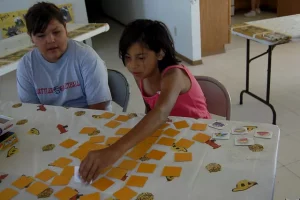
A recently released review of studies finds no evidence that working memory exercises improve general cognitive performance.
In the last several years, working memory exercises have gained popularity. This is due in part to their claims to benefit students. They are often sold as help for poor academic performance, ADHD, dyslexia, language disorders, and other issues. Some even claim to boost people’s IQs.
Memory exercises are increasingly found online, and are widely used around the world in schools and clinics. Most involve tests often used by cognitive scientists to study memory in laboratory experiments. This means they weren’t originally made to be fun or beneficial. The question for folks seeking to get a little smarter is– do they really work?
A review of research testing the benefits of working memory exercises addressed the question head on. The study was led by Monica Melby-Lervåg of the University of Oslo. Her team found that memory exercises appear to have limited effect on healthy adults and children looking to do better in school or improve their cognitive skills.
The study also concludes that working memory exercises are unlikely to be an effective treatment for children suffering from attention-deficit, hyperactivity, or dyslexia.
According to Melby-Lervåg, the belief that memory exercises help is often based on the idea that you can train your brain in much the same way as you can lift weights to build muscle. Her review of the research shows memory exercises do not improve memory outside of the tasks presented within these tests.
The problem that any gains made on the memory exercises don’t transfer to new situations is a common one in cognitive science. This is what makes mind building different and harder than body building. Some cognitive skills do transfer, such as memory retrieval practice. These skills are rare and important.
Working memory enables people to recycle information for short periods of time. One example of a working memory exercise is to be given a series of numbers one at a time on a computer screen. The computer shows a new digit and erases the last one. The trainee is prompted to recall the number no longer shown. More difficult versions of the memory exercise ask trainees to recall the number that appeared two, three or four digits ago.
In a meta-analysis of 23 peer-reviewed studies, Melby-Lervåg and her colleagues found that working memory exercises improved performance on tasks related to the training itself. That is, you can get better at remembering the sequence of digits presented to you.
However, the memory exercises did not improve other cognitive skills such as verbal skills, attention, reading or arithmetic. The findings cast strong doubt on claims that working memory exercises improve cognitive ability and scholastic attainment. For example, it’s doubtful they would improve note taking ability, even though it taxes working memory. A better bet would be to read your textbook before class, so that you can mentally access and juggle the specific concepts in the course more readily.
Do the findings imply that there is no hope for people who want to learn better?
No, that would be an overgeneralization. There are a number of study strategies that have been researched and scientifically proven to aid in learning and thinking better. You can learn and practice these effective strategies in our online study skills course.
The current results imply that the very intuitive weightlifting analogy doesn’t hold up. Boring memory drills will not do for your working memory what curls will do for your biceps.
Image credit: Interrobang

that is a very good reminder for me as i am seriously considering computer aided working memory program for my son. So wherelse can i go besides these softwares to help him? much appreciate any further advice …best…
Thanks KM. In general, for normally developing kids, I recommend exposure to learning/study skills for kids junior high and up. For younger kids, I suggest encouraging interest in reading, exploring the things they are curious about, and lots of play. Building knowledge about the world is useful, and the “world history for kids” article describes one way. If there are any particular concerns about normal development, then I’d suggest seeing a specialist.
I do believe play certain games will help improve learning better!
In playing games, it helps to focus, critical thinking, and problem solving – important elments in learning a new skill or simply doing a math problem.
Even in a basketball game, your focus on making sure the ball will go into the loop, you might lose the game, but in reality you had just learned to concentrate!
I hope the people reading this do their own research. There are several studies published in the last year that show the opposite results. They show that there are significant increases across specific tasks as well as generalized increases in fluid intelligence. Not surprisingly to me you will find the results appear to be dosage based. All of the studies I found on the no increase side have a low dosage.
If I go on the treadmill for 7 hours over 4 weeks, I wouldn’t expect that I’m going to be able to play basketball any better, but I also wouldn’t call that a reasonable study either.
The studies you mention sound quite interesting, struan. Please provide references, so I can look into them – and other readers can, as well. The issue is certainly controversial, though I have not seen data showing meaningful transfer across tasks from working memory exercises.